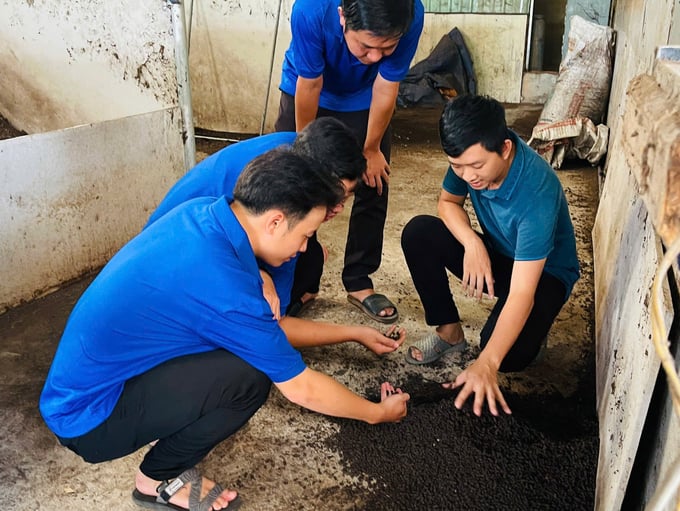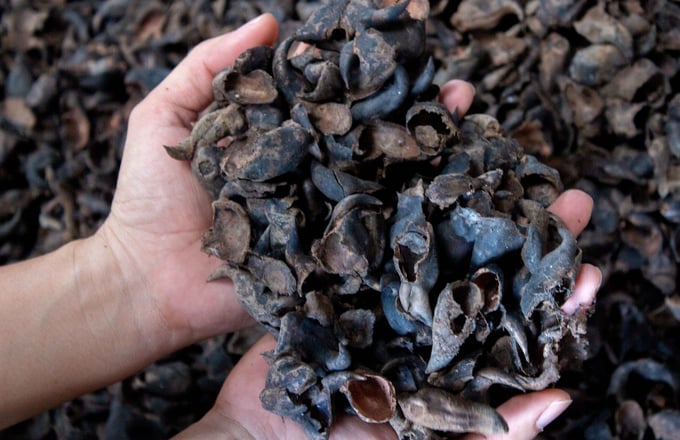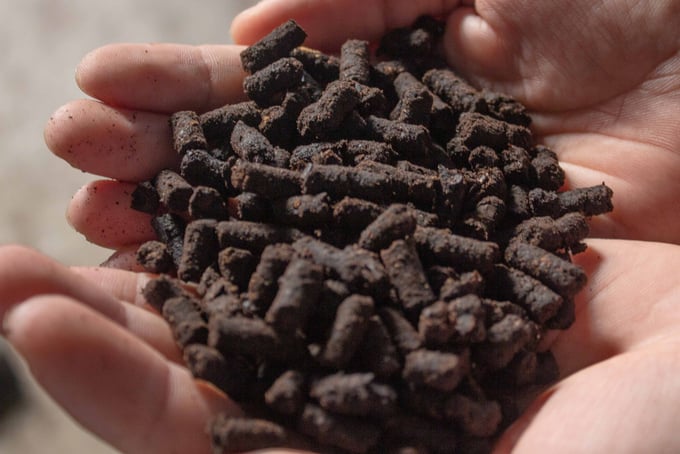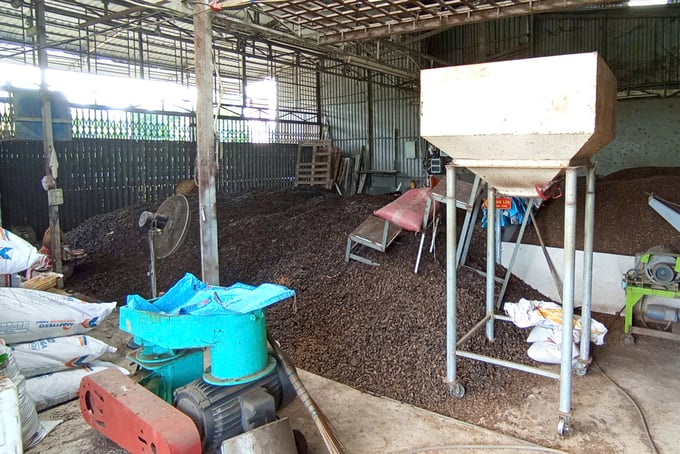November 23, 2025 | 21:29 GMT +7
November 23, 2025 | 21:29 GMT +7
Hotline: 0913.378.918
November 23, 2025 | 21:29 GMT +7
Hotline: 0913.378.918

Nguyen Truong An (far right) introducing his organic fertilizer product made from water caltrop husks. Photo: Provided by the subject.
Nguyen Truong An, a young entrepreneur from Binh Thanh Commune (Lap Vo District, Dong Thap Province), recognized the growing trend of organic production and the use of organic products as a sustainable approach for agricultural development. Subsequently, he dedicated himself to researching local agricultural by-products, including water caltrop husks.
After noticing that farmers in Lap Vo District were discarding large amounts of water caltrop by-products, which contribute to environmental pollution issues, An utilized his experience in biotechnology to study the production of organic fertilizer from these husks.
The biggest challenge in An's research efforts was the lack of Vietnamese materials on water caltrops. Consequently, he gathered information from international sources, primarily Taiwan, where water caltrop farming is a developed industry. After two years of exploration and study, An successfully produced the first batch of organic fertilizer made from water caltrop husks in January 2023.

Organic growing medium made from water caltrop husks. Photo: Phuc An.
An shared, "The organic fertilizer made from water caltrop husks stands out compared to other organic fertilizers, such as those from chicken manure, cow manure, or earthworms, because it has no unpleasant odor, either during production or in the final product. This feature helps reduce air pollution during the manufacturing process and provides a more pleasant experience for farmers."
In addition to its environmental benefits, the introduction of organic fertilizer from water caltrop husks also helps boost local income by utilizing agricultural by-products. It further extends the value chain of water caltrop production in Lap Vo district.
"After water caltrop is processed into various products, the husks left in the natural environment take up to six months to decompose. As an alternative to discarding the husks, I collect these by-products from local processing facilities, grind them down, and ferment them with Trichoderma. After 1.5 months, the organic fertilizer is ready for use," An added.

Compressed organic fertilizer pellets made from water caltrop husks. Photo: Phuc An.
An's organic fertilizer product was quickly endorsed by local gardeners, who have found it to be effective for ornamental plants and fruit trees. Accordingly, the product promotes lush, thick foliage, sustainable growth, and provides ample nutrients for the plants.
However, several gardeners have expressed concerns that fertilizer made from water caltrop husks may be less effective compared to other fertilizers on the market. Andy believes that this skepticism originates from farmers and gardeners accustomed to using chemical fertilizers. As a result, they are not fully exposed to the benefits of organic agriculture and organic fertilizers.
An is confident that consumer attitudes will gradually shift as local authorities introduce additional policies and awareness campaigns on organic farming in the near future. He expects his product, along with other organic fertilizers, to be more positively received.

An's production facility for organic fertilizer made from water caltrop husks. Photo: Phuc An.
To date, An has launched two products: compressed organic fertilizer pellets and organic growing medium. These products primarily serve local gardeners in the flower village of Sa Dec and several orchid farms within Dong Thap Province.
Moving forward, An plans to continue improving his products in response to customer needs. Furthermore, he will collaborate with e-commerce distribution channels to reach a broader customer base across the country, particularly in Ho Chi Minh City. He also intends to partner with local water caltrop processing businesses to procure husks in bulk, thereby facilitating an expansion of production scale.
Experiences and studies from Taiwan indicate that various effective models exist for recycling agricultural waste into valuable products, thereby contributing to the promotion of a circular economy.
According to Professor Deng Wen-Ling from National Chung Hsing University in Taiwan, agricultural waste includes organic and inorganic materials that are discarded during the processes of crop and livestock production, such as stems, straw, leaves, husks, livestock waste, food scraps, agricultural chemicals, and packaging used in production and supply chains. Accordingly, Taiwan has implemented multiple solution to transform agricultural waste into high-value-added products.
In addition, Taiwan has developed biocomposting technology to transform agricultural waste into ecological materials (low carbon, biomass, renewable), such as biodegradable plastic bags, bioplastics, footwear, clothing, food containers, and utensils.
Translated by Nguyen Hai Long

(VAN) The information was shared at the seminar 'Urban Agriculture - Solutions for Developing Green Spaces,' organized by the Kinh te & Do thi Newspaper and the Biotechnology Center of Ho Chi Minh City.
/2025/11/19/4141-2-132831_216.jpg)
(VAN) One of Japfa's outstanding solutions is implementing digital transformation and artificial intelligence (AI) to optimize operations, enhance productivity, and advance sustainable development.
/2025/11/19/4847-1-093540_448.jpg)
(VAN) The Gia Lai Provincial People’s Committee had a working session with the delegation of the U.S. Department of Agriculture, the State of Idaho, and representatives of the State's leading enterprises.

(VAN) Ca Mau has a sufficient foundation to become a strong regional aquaculture center, where production integrates the economy, the environment, and the lives of the people.

(VAN) SEIKI Group envisions itself as a pioneer in the ‘dual transformation’ of digital technology and green industry, standing alongside the Government and Vietnamese businesses in their pursuit of sustainable development.

(VAN) The VNGEONET network affirms Viet Nam's progress in mastering digital space, providing a precise positioning data platform to serve socioeconomic development.
/2025/11/14/3247-1-184556_35.jpg)
(VAN) Thai Nguyen is methodically implementing digital transformation in the livestock sector, laying the foundation for a modern, transparent, and sustainable agriculture.